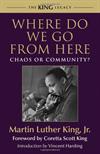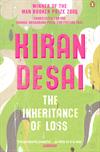
Where Do We Go from Here: Chaos or Community?
1 journaler for this copy...
There's an organization here in Ithaca that's trying to get everyone in town to read this book.
Civil Rights laws had been passed, but... This book is largely centered around what to do with the frustrating situation of governments that don't do anything to implement the laws they pass, who don't budget money for remediation programs and enforcement; whites who turn their attention away after the first statement of support; who think blacks are asking for too much; who want limited justice but not full equality -- and with the frustration, division, apathy, violence, that overtake the attitudes of black activists. With that, King is facing one of the most stubborn problems for activism, and one that is certainly disastrously prevalent nowadays. It is harder to get people to make material changes, even limited ones, than to express support. For example, there is surprising resistence to something as simple as anonymizing applications and article suppressions to minimize gender bias -- that doesn't even cost money, but people would have to stop saying "we support women" and realize that they actually are biased if they were to take positive actions. More insidiously, I don't see how to combat fatigue and apathy.
King also restates here his arguments in favor of nonviolence and critiques "Black Power" for its violent rhetoric. He also criticizes those black activists who want to cut ties with whites, pointing out that no minority can accomplish anything without enlisting the majority in their support, and without active collaboration.
Mostly, though, the problems to be solved then and now were economic. Job and housing discrimination both worked to the economic advantage of many whites and tied in with deep racism. But just like the ambivalence King pointed out in these pages between democratic and racist beliefs, there is a division in American life between conscious belief in equality and an unconsciously maintained economic system that relies on a supply of cheap labor -- people must work in their own self-interest to actively keep a class of economic inferiors suppressed, while unaware that they're contradicting their expressed commitment to giving everyone a fair shake. In Chapter 3, King pointed out that for white americans to live up to their potential and really flourish in their ideals, they have to become aware of their own racism. But it is equally necessary for the economic situation (and gender situation for that matter) to be brought to the surface; otherwise, we will continue to live in self-contradiction, strain, and tension.
This makes the discussion of the sources of concrete power in chapter four all the more interesting (some of them stand up to further experience and changing times better than others, of course). There's a guide to focused, effective boycotts -- it's no wonder that this tactic doesn't work so well on a national level. The economic leverage of minorities and the poor has gotten worse lately, and unions lose power. Nonetheless, the project of incorporating minorities into unions has been pretty successful, it seems (King was very right that unions can't get along without them). In the political arena, the problem of "representation" by powerful men who have little in common with their constituents besides color remains serious. Voters are apathetic in proportion. And the major parties are still dominated by white power-brokers. Nonetheless, the other goal King mentions, to form alliances between black activist organizations and others, is more achieved. Also, the pages that talk about forming lasting, long-term-goal organizations seemed to me valuable.
I remained surprisingly unimpressed by King's vaunted rhetorical powers; among other things, he relies on the kind of cornball example-stories I'd expect from a motivational-speaking hack. He does rise to a fairly good rhetorical flourish at the very end, though. He has an ability to first acknowledge the value of a wide variety of human thought and then vaunt Christianity as the one way to save humanity, and also acknowledges the limitations of "Western" charity to improve the rest of the world in the same breath as advocating it. His is the kind of limited perspective that's easy for those of other faiths to work with, though. All in all, a worthwhile reading experience.
King also restates here his arguments in favor of nonviolence and critiques "Black Power" for its violent rhetoric. He also criticizes those black activists who want to cut ties with whites, pointing out that no minority can accomplish anything without enlisting the majority in their support, and without active collaboration.
Mostly, though, the problems to be solved then and now were economic. Job and housing discrimination both worked to the economic advantage of many whites and tied in with deep racism. But just like the ambivalence King pointed out in these pages between democratic and racist beliefs, there is a division in American life between conscious belief in equality and an unconsciously maintained economic system that relies on a supply of cheap labor -- people must work in their own self-interest to actively keep a class of economic inferiors suppressed, while unaware that they're contradicting their expressed commitment to giving everyone a fair shake. In Chapter 3, King pointed out that for white americans to live up to their potential and really flourish in their ideals, they have to become aware of their own racism. But it is equally necessary for the economic situation (and gender situation for that matter) to be brought to the surface; otherwise, we will continue to live in self-contradiction, strain, and tension.
This makes the discussion of the sources of concrete power in chapter four all the more interesting (some of them stand up to further experience and changing times better than others, of course). There's a guide to focused, effective boycotts -- it's no wonder that this tactic doesn't work so well on a national level. The economic leverage of minorities and the poor has gotten worse lately, and unions lose power. Nonetheless, the project of incorporating minorities into unions has been pretty successful, it seems (King was very right that unions can't get along without them). In the political arena, the problem of "representation" by powerful men who have little in common with their constituents besides color remains serious. Voters are apathetic in proportion. And the major parties are still dominated by white power-brokers. Nonetheless, the other goal King mentions, to form alliances between black activist organizations and others, is more achieved. Also, the pages that talk about forming lasting, long-term-goal organizations seemed to me valuable.
I remained surprisingly unimpressed by King's vaunted rhetorical powers; among other things, he relies on the kind of cornball example-stories I'd expect from a motivational-speaking hack. He does rise to a fairly good rhetorical flourish at the very end, though. He has an ability to first acknowledge the value of a wide variety of human thought and then vaunt Christianity as the one way to save humanity, and also acknowledges the limitations of "Western" charity to improve the rest of the world in the same breath as advocating it. His is the kind of limited perspective that's easy for those of other faiths to work with, though. All in all, a worthwhile reading experience.








